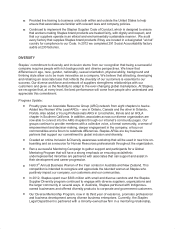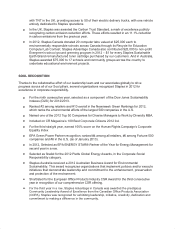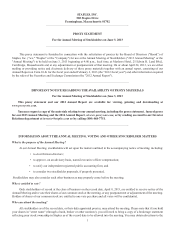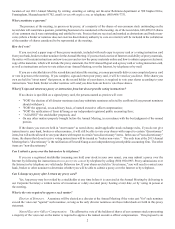Staples 2012 Annual Report Download - page 16
Download and view the complete annual report
Please find page 16 of the 2012 Staples annual report below. You can navigate through the pages in the report by either clicking on the pages listed below, or by using the keyword search tool below to find specific information within the annual report.7
Enhanced Disclosures Under our Political Contributions Policy. In response to increasing general interest in corporate
political activities, our Board proactively revised our political contributions policy in 2012 from reporting solely on
monetary political contributions from corporate funds to also providing disclosures of the amounts attributed to political
activities of our material trade associations and our lobbying activities.
Chief Culture Officer. In our ongoing commitment to responsible corporate citizenship, Staples created a new role of
Chief Culture Officer in 2012. This individual is tasked to drive improved associate engagement and to coordinate
Staples' approach to corporate responsibility. The person will also champion our approach to ethics, environmental
sustainability, community relations, and diversity and inclusion. In addition, our Chief Culture Officer serves as President
of the Staples Foundation, our non-profit philanthropic organization.
You can learn more about our current corporate governance principles and review our Corporate Governance Guidelines
("Guidelines"), committee charters, Corporate Political Contributions and Government Activity Policy Statement, Code of Ethics
and other significant policies at www.staples.com in the Corporate Governance section of the Investor Information portion of our
website. We comply with the corporate governance requirements imposed by the Sarbanes-Oxley Act, SEC and NASDAQ Stock
Market. We will continue to modify our policies and practices to meet ongoing developments in this area. While we have discussed
many features of our corporate governance principles in other sections of this proxy statement, some of the highlights are:
Stockholder Features
Annual Election of Directors. Our directors are elected annually for a term of office to expire at the next annual meeting
(subject to the election and qualification of their successors).
MaMority Voting. Under our by-laws, in uncontested elections, our directors are elected if the votes cast "for" the director's
election exceed the votes cast "against" the director's election. If an incumbent director in an uncontested election does
not receive the required number of votes "for" his or her election, our Guidelines provide that such incumbent director
must tender his or her resignation from our Board.
No Stockholder Rights Plan. We do not currently have a stockholder rights plan in effect. Our Board has adopted a
stockholder rights plan policy under which we will adopt a stockholder rights plan only if the plan has been approved by
stockholders either in advance or within 12 months of its adoption by our Board.
No SupermaMority Provisions in our Certificate of Incorporation. We have no supermajority voting requirements
under our certificate of incorporation.
Right of Stockholders to Call Special Meetings. Our by-laws provide that stockholders who own in the aggregate 25%
or more of our outstanding stock may call special meetings.
MaMority Written Consent. As described above, our stockholders now have the right to act by majority written consent.
Board Features
Independent Board. Our Board is comprised of all independent directors, except for our Chief Executive Officer
("CEO").
Annual Review of Board Leadership Structure. As described in more detail below, every year our Board evaluates
its leadership structure and based on a recommendation from the Nominating and Corporate Governance Committee
determines whether there should be an independent Chairperson of the Board or an independent Lead Director.
Strong Lead Director Role. Among many other responsibilities, our independent Lead Director ensures that independent
directors meet in executive sessions, coordinates the annual performance review of our CEO, and works with the
Chairperson of the Board to establish the agenda for each Board meeting. Additional information about the responsibilities
of our independent Lead Director can be found under the section of this proxy statement called "Board Leadership
Structure".
CEO Evaluation. Every year the independent Board members participate in our CEO's evaluation. The evaluation is
done in executive sessions, without him being present. It is led by our independent Lead Director and the Chair of the
Nominating and Corporate Governance Committee. The evaluation is also used by the Compensation Committee in
determining compensation for the CEO.
Succession Planning Process. As required by our Corporate Governance Guidelines, our Nominating and Corporate
Governance Committee continually reviews succession planning as it relates to the CEO. To assist in this process, the
CEO prepares an annual report on succession planning for himself and other key senior leadership positions. The report
is part of a proactive enterprise wide annual talent management process. In addition, on a continuing basis, the CEO is
required to provide recommendations regarding his successors should he become disabled. Periodically, the Nominating
and Corporate Governance Committee also engages consultants for succession planning strategy and to identify external
candidates.
























